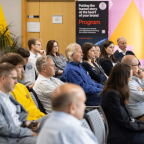
Robert Hillier: Technology is our future but G7 politicians are struggling to keep up
As he heads to the G7, journalist and Tribe Tech podcast co-host Robert Hillier pleads with politicians to acquire a better understanding of technology to inform the policy decisions that will shape our future.
Within the leaders of the G7, we have degrees in classics, law, public affairs, arts, economics and, in Chancellor Merkel, a Doctor of Quantum Chemistry (who’s surprised? And could a contemporary UK Prime Minister have such a qualification?)
So, Germany aside, there’s not a STEM subject in sight. Is it any wonder that there's still such a disconnect between technology and policy-making? The bureaucratic systems we have in place are largely unchanged since WWI when they couldn’t move swiftly enough in the four weeks following an assassination to stop a conflict no one wanted and few could explain. Now, as financial markets lay fibre optic cables to shave milliseconds off the transfer of information across oceans...English council members are not even allowed to vote if they attend on Zoom.
Technology experts and politicians don’t live in the same world. CP Snow, in his 1959 essay The Two Cultures called the split a major hindrance to solving the world’s problems. That’s 60 years ago and what’s changed? Policy makers can’t keep up with technology – and those who run the big tech companies know it.
If we take AI – a recurring subject on our Tribe Tech podcast it has the potential to replace notoriously subjective human decision-making processes with something fairer, more consistent, faster and more scalable. But it also has the potential to entrench bias and codify inequity, and to act in ways that are unexplainable and undesirable. It can be hacked in new ways, giving attackers from criminals and nation states new capabilities to disrupt and harm. How do we avoid the pitfalls of AI while benefiting from its promise? Or, more specifically, where and how should the government step in and regulate what is largely a market-driven industry?
The answer requires a deep understanding of both the policy tools available to modern society and the technologies of AI. Do our governments have this? Replace AI with cyber-security, social media and information, bio-tech, robotics and ask yourself the same question.
To make effective tech policy, policymakers need to better understand technology. For some reason, ignorance about technology isn’t seen as a deficiency among our elected officials.
This doesn’t mean policymakers need to become tech experts any more than we expect them to be public health experts. Our policies on Covid-19 are, largely, informed by medical experts. It wouldn’t be considered acceptable for a senior politician to josh that they didn’t have a basic knowledge of epidemiology anymore. Nor should it be ok to do the same with technology – technology, which is framing our world more than the coronavirus ever will.
Can the G7 leaders get to grips with the opportunities and challenges presented by technology or will the real power continue to lie elsewhere?
That is what I’ll be asking in Cornwall.
Robert Hillier is a journalist and communications consultant who co-presents the Tribe Tech podcast. During 20 years in journalism, he has worked for the BBC, CNN and Sky.







